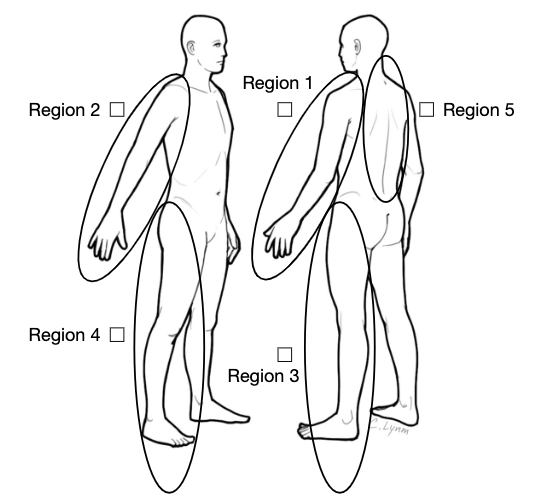Professionals
Medical professionals looking for quick tools and information to support patients with fibromyalgia can find resources below.
For healthcare professionals, diagnosing and managing fibromyalgia can be demanding, especially given its variability across individuals and the absence of definitive diagnostic tests. Yet, with growing research, evolving clinical guidelines, and an increasing understanding of central sensitization and related mechanisms, providers now have more tools and insight than ever before to improve patient outcomes. Fibromyalgia presents a complex clinical challenge. Its multifaceted nature—characterized by chronic widespread pain, fatigue, sleep disturbance, cognitive dysfunction, and often overlapping comorbidities—requires a nuanced, patient-centered approach to care.
Supporting Clinical Care for Patients with Fibromyalgia
This page is designed as a comprehensive, evidence-informed resource hub for professionals — physicians, nurse practitioners, physiotherapists, psychologists, and other allied health professionals who support individuals living with fibromyalgia. Whether you are looking for patient handouts to explain symptom management strategies, screening tools to aid diagnosis, or continuing education opportunities to enhance your own clinical understanding, you’ll find streamlined access here to the information and materials you need.
If you are interested in professional development opportunities, case consultation options, or contributing to ongoing research and patient education initiatives, please connect with us—we welcome collaboration and believe that a team-based approach to fibromyalgia is essential to improving care across the board.
Diagnostic & Medication Information for Professionals
Medications
We’ve created some Fact Sheets about the most common medications currently used in Canada for treatment of fibromyalgia.
Diagnostic Criteria & Tools
Geared towards medical professionals, this fact sheet gives a quick overview of the diganostic criteria for assesing patients for potential fibromyalgia.
Research Highlights
Learn about recent research in the area of fibromyalgia. These informative lay summaries provide snapshots of the more recent studies and trials.
Patient Support
Medications
We’ve created some Fact Sheets about the most common medications currently used in Canada for treatment of fibromyalgia.
Cymbalta™ or its Generic Duloxetine
Learn about Cymbalta™ (generic name Duloxetine) for use with fibromyalgia with our Fact Sheet.
Fact Sheet – for Patients and Families
This fact sheet on fibromyalgia offers clear, reliable information for patients and families. Learn about common symptoms, diagnosis, and treatment approaches to help manage daily challenges.
Fibromyalgia in Children and Youth
Get the facts about fibromyalgia in children and youth with this informative fact sheet. Learn how fibromyalgia affects young people, including common symptoms, diagnosis challenges, and treatment options. This resource supports families, educators, and healthcare providers in understanding and managing pediatric fibromyalgia.
Medical Professionals Community Presentations
Christine Lamontagne Presentation
Dr Christine Lamontagne is a pediatric anesthesiologist, pain physician and clinical researcher at the Children’s Hospital of Eastern Ontario in Ottawa. She is the Medical Director of the Chronic Pain Services where she has lead the creation of an interdisciplinary chronic pain clinic. She has Co-Chaired the development of the Ontario Pediatric Chronic Pain Network in partnership with the Ontario Ministry of Health and continues to work at improving access to interdisciplinary chronic pain care for all children. Watch this presentation about fobromyalgia in children & youth.
POTs
POTS (Postural Orthostatic Tachycardia Syndrome) and fibromyalgia are chronic conditions that often overlap, sharing symptoms like fatigue, brain fog, and pain.
While POTS primarily affects the autonomic nervous system, both conditions can significantly impact quality of life, and understanding their connections can help guide treatment approaches.
In this presentation Kate Bourne will discuss the causes of POTS, how POTS is diagnosed, and what treatments can be used to help reduce symptoms.
Tyler Dillman
Tyler discusses how exercise and movement can be a powerful tool for managing pain.
While pain might make us want to move less, research shows that targeted movement can actually help reduce pain levels and improve quality of life. Tyler dives into the science of how exercise affects pain, looks at different types of exercises that can benefit various conditions, and discusses how to get started safely.
Whether you’re managing chronic pain or looking to support someone who is, this presentation will provide insights into making exercise a practical part of pain management.
David Gardner
Dr. David Gardner, BSc Pharm, ACPR, PharmD, MSc (CH&E) provided information about some of the latest and innovative treatments for insomnia. His presentation covers tips and tools to help people with fibromyalgia to sleep better.
We understand the time pressures that come with busy practices. That’s why our resources are curated with practical use in mind: printable guides for patients, clinical decision-making tools, and up-to-date references to key studies and consensus recommendations. Many of these tools are designed to foster shared decision-making, encourage self-management, and reinforce a biopsychosocial model of care—ensuring that both physical and emotional aspects of fibromyalgia are addressed in a compassionate, holistic manner.
Our goal is twofold: to support you as a clinician with tools and training that can make fibromyalgia care more effective and efficient, and to enhance the quality of life for your patients through improved understanding, earlier diagnosis, and informed treatment strategies. We recognize that many patients with fibromyalgia have had difficult diagnostic journeys or have felt dismissed or misunderstood by the healthcare system. Your ability to listen, validate, and engage with them meaningfully makes a powerful difference. With the right resources at your fingertips, you can help guide patients toward greater symptom control, function, and hope.
This portal reflects the expertise and lived experience of individuals with fibromyalgia, as well as the insights of clinical professionals, researchers, and educators in the field. It is continually updated to reflect new evidence and best practices. We invite you to explore the resources below, bookmark this page for future reference, and share it with your colleagues. Whether you are newly encountering fibromyalgia in your practice or have been supporting these patients for years, we hope this page serves as a helpful companion in delivering informed, empathetic care.
Let’s continue to build a better, more compassionate standard of care for those living with fibromyalgia—together.











